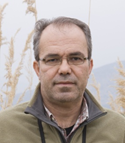
Dimitrios Bakaloudis
Assistant Professor
School of Forestry and Natural Environment
Lab. of Wildlife & Freshwater Fisheries
Aristotle University of Thessaloniki
Greece
Dr. Bakaloudis currently holds a position of an Assistant Professor of Wildlife Management at the School of Forestry & Natural Environment in Aristotle University of Thessaloniki, Greece (2013-present). My professional experience includes: Head of the Dadia-Lefkimi-Soufli Forest National Park (2014-present), Lecturer (Technological Educational Institute of Kavala, Greece) (2006-2012), Lecturer (Democritus University of Thrace, Greece) (2011-2012), Forest engineer (Forest Service, Greece) (2001-2006). Academic studies: “The Ecology of Short-toed Eagle (Circaetus gallicus, Gm.) in Dadia-Lefkimi-Soufli Forest Complex, Thrace, Greece” Doctoral dissertation in School of Animal and Microbial Sciences in the University of Reading, UK (1996-2000), Sabbatical in Swiss Ornithological Institute (2010), Undergraduate studies in the Department of Forestry & Natural Environment in the Aristotle University of Thessaloniki (1987-1992). I published more than 44 peer reviewed articles in international journals, 2 books and 3 chapters in books. I reviewed articles in more than 26 international scientific journals.
His overall research objective is the conservation of vertebrate species, in particular those considering as rare and/or endangered. My research interests and experience also are in wildlife ecology and conservation, biodiversity conservation and community ecology. More specifically there are four focus areas of my work: a) endemic and endangered species conservation, particularly mammals, birds and reptiles, b) wildlife-human conflicts, c) wildlife-habitat relationships, and d) species distribution modeling. I am also highly interested in interdisciplinary research, which bridges between biological organisms and disciplines in need for high-performance statistical analyses.
Journal of Biodiversity & Endangered Species received 624 citations as per Google Scholar report